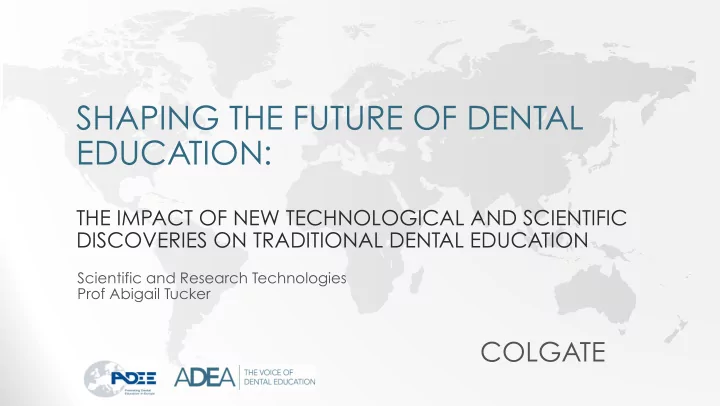

SHAPING THE FUTURE OF DENTAL EDUCATION: THE IMPACT OF NEW TECHNOLOGICAL AND SCIENTIFIC DISCOVERIES ON TRADITIONAL DENTAL EDUCATION Scientific and Research Technologies Prof Abigail Tucker COLGATE
SCIENTIFIC AND RESEARCH TECHNOLOGIES • What might the dentist of the future need to know? • How can we bring new scientific discoveries and research into the curriculum? • How do we choose which advances to teach?
WHAT NEW ADVANCES ARE OUT THERE? • New generation sequencing: paving the way for personalised dentistry • The microbiome: understanding interactions with our microbiome for early diagnosis • New materials: biomaterials to aid regeneration • New imaging techniques: early diagnosis • CAD/CAM: 3D printing teeth and devices
ARE BIONIC TEETH THE FUTURE? Pacey, BDJ, 2014
SOME LOCAL EXAMPLES • Enhancing the tooth’s innate ability to repair (bioactive materials) • Enhancing re-mineralisation (nanotechnology) • New ways to detect caries (novel imaging tools)
PROMOTION OF NATURAL TOOTH REPAIR Stimulation of pulp stem cells by Wnt signalling Neves et al., 2017 Scientific reports Paul Sharpe
ENHANCING MINERALISATION EAER (Electrically Accelerated & Enhanced Remineralisation) Small electric field from dental instrument Tooth with clean lesion Mineral Nanoparticles Nigel Pitts 7
Caries Detection by Near-Infra Red Imaging • Using safe, near-Infra red, 3D imaging to help Dentists better assess, preventively manage & monitor dental caries. • A hand-held image capture device which acquires 3D images of individual teeth, displays the images on monitors (in a similar way to radiographic images) and can be linked to standard dental practice software systems. Nigel Pitts
ARE MODERN DENTISTS TAKING ADVANTAGE OF NEW RESEARCH? • Don’t Know, Can’t Do, Won’t Change: Innes et al., 2016, JDR • Move towards minimally invasive dentistry • Invasive operative management of enamel lesions is not supported by evidence from current research but despite this 40-80% of dentists worldwide still chose a drill over managing them preventatively or micro invasively. • Need to create a workforce that is more willing to change, more willing to ask questions about procedures, and to want to learn about new research
INVOLVING RESEARCH IN THE CURRICULUM • Making sure students know how to obtain information about the latest scientific research and are able to interpret the literature • Making sure students question where the information they are being told comes from: what is the evidence (forming critical thinkers) • Making sure students appreciate how dentistry progresses and how new research/innovation will impact on their life as a dentist
LOCAL EXAMPLES: 1 • Year 2 BDS students have to write a 5,000 word student selected topic on an area of dental/oral research. • Trained in how to use databases to search for research papers • Trained in using endnote to collate references • Trained in how to read scientific papers • Time provided to focus on topic over an extended period (6 months) • Partnered with a staff member who is an expert in research in the subject area for one to one discussion • Gold star certificates presented to best projects • Opportunities to apply for ABSTD (associated of basic science teachers in dentistry) oral bioscience essay competition Isabelle Miletich
LOCAL EXAMPLES: 2 • Teaching the evidence behind the information taught • For example, providing tutorials/lectures on animal studies and clinical trials to understand how pieces of information have been generated and integrated into practice • Testing knowledge but also the basis behind the knowledge throughout the course • For examples in an essay question, asking not only about a procedure, but what research was performed to create/test/ analyse that procedure
LOCAL EXAMPLES: 3 • Being exposed to New Technologies during studies • For example using Haptics (HapTEL virtual dental simulator) • Trying out 3D printing Margaret Cox Barry Quinn Rupert Austin
LOCAL EXAMPLES: 4 • Exposing students to research • Summer studentships for dental students to take part in research funded by King’s College London. • Dental students can chose from over 150 projects on a diverse array of research topics to spend 4-8 weeks over the summer • Opportunity to apply for King’s Experience Research Award
HOW TO DECIDE WHAT NEW RESEARCH TO TEACH • Which of the many new technologies/research areas should we teach to our students? • Should there be guidelines about how to choose? • Are some technologies more promising than others? • What is the best way to integrate research and new technology into the curriculum These are some of the areas we would like to tackle in today’s workshop
Recommend
More recommend